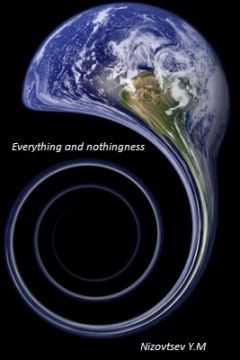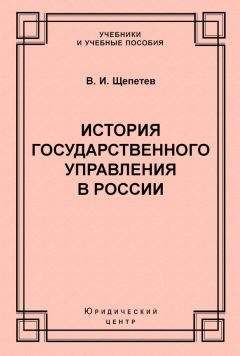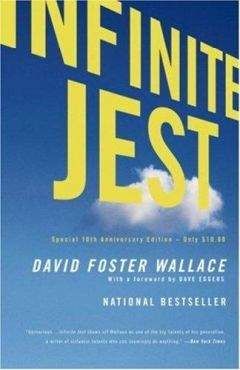Юрий Низовцев - Everything and nothingness
На сайте mybooks.club вы можете бесплатно читать книги онлайн без регистрации, включая Юрий Низовцев - Everything and nothingness. Жанр: Религия издательство -,. Доступна полная версия книги с кратким содержанием для предварительного ознакомления, аннотацией (предисловием), рецензиями от других читателей и их экспертным мнением.
Кроме того, на сайте mybooks.club вы найдете множество новинок, которые стоит прочитать.

Юрий Низовцев - Everything and nothingness краткое содержание
Everything and nothingness читать онлайн бесплатно
Therefore the foundation is there and sensations of the person are addressed to it and perceive this aught, and it does not necessarily have to be the same as the person himself, as his consciousness, and along with that the subject existing irrespective of consciousness. Could it be quite strange situation, when things and is, and along with that things don't exist?
Such opportunity appears only if everything is merged together in infinity in which there is no time. In principle, the subject world can be "derived" in the existence from the infinite which represents by itself both everything, and nothing, however things, which are merged together in the eternal, in the original can't "pull out" from there if even there is a possibility to identify them.
Nevertheless, a problem of emergence of objective changing world is solved, if infinite timeless Uniform, remaining motionless and eternal, may exist along with that as the finite, the temporary, but the real, inasmuch without the temporary the eternal is non-existence.
However two prerequisites are necessary for such "co-existence" of the infinite and the finite.
One of them can be seen immediately: there is everything in infinite Uniform, except time. Hence, there is potentially aught active, thinking in Uniform, as well as there is the passive in it, upon which and in which, in principle, it is possible "to work" to this active and deprive the passive of timeless immobility in some way.
The second prerequisite consists in providing formation of the changeable, finite that we determine as existing which express duration and sequence of events, i.e. time. At this, eternal Uniform remains as the same.
This finite and changeable can be formed from the passive only by the active – there is nobody more – as it can, time it has understanding of itself and, therefore, the essence of the active is aspiration to changes. However for achievement of this purpose the active has to "get out" somehow out of infinity and along with that to remain there.
From this situation for active there is only one exit: to have own copies in the multiplicity of individual particles, which, nevertheless, remain united, and this unity coincides with the unity of the active in infinity.
A holographic formation is suitable for achievement of this purpose: in a holographic picture each particle of the active doesn't lose unity with all infinite set of active particles and therefore can, in particular, by means of this unity to distinguish, read out and copy using own means things, necessary for own existence, in their communication, identifying theirs from Uniform according to the understanding, which this active has, so, how it wants and can, updating every "moment", i.e. discretely, but infinitely of the holographic projection as the basis for its own existence.
Particles-copies of the active, or particles-copies of consciousness, thus, "receive" out of the infinite the copies of things (the passive), which are required for "replacement" (update) by them of previous copies of things in the holographic projection. The things themselves remain in infinite Uniform in a conjoint state as and consciousness, and along with that by means of copies of particles of consciousness are manifested as a result in the form of the environment surrounding particles of consciousness as if outside and from within. That is in the manifested reality the "objects" from Uniform don't appear as such, but they are present nevertheless at this reality in the form of copies which are being updated.
Itself holographic picture of allб that are manifested in timeб can't but be the material. By definition, this picture contains the frequency formations. Itself multiple copies of single consciousness, which possess self-consciousness, have one frequency structure, the living beings without self-consciousness have other frequency spectrum, and things from Uniform, identified by particles of consciousness, are formed by consciousness in the form of information copies of things as the simplest frequency structures which are qualified as lifeless matter and which make the real worlds. At this, in the sum this undulating holographic structure has to be in antiphase, i.e. it is equal to zero.
Interestingly, this process falls under the Hegelian triad, inasmuch the thesis in the form of eternal and infinite Uniform passes into the antithesis in the form of the finite in the infinite update (projection of Uniform), i.e. in time, coming to the end as the synthesis in formation of equilibrium unity of the temporary, the finite in infinity and the infinite, the eternal, the motionless that holds all system in existence in spite of the fact that on material balance this system as if also isn't present.
A holographic projection, formed by consciousness, has no motion, but, as it is paradoxical, it is changing, more precisely, updated sequentially picture, owing to indissoluble communication of consciousness in the projection in own multiple-single expression with timeless Uniformб in which everything is merged together, but it can be "allocated" in the form of motionless copies every "moment" (position) of updating.
Consciousness gets opportunity of life in sequences of these updates of the projection, opportunity to change, at this eternal infinite Uniform "goes", thereby, in real beingness, as if coming to life in time and along with that, retaining itself from falling in non-existence in which can occur nothing.
Thus, there is no motion in eternal and infinite Uniform – and that is understandable for the timeless, there is no motion and in a holographic projection of Uniform, – and that too is understandable: consciousness no need to move copies of things from Uniform – it is enough only to update them in information process of identification in irreversible sequence on the basis of Uniform, in which the single consciousness has an access, as if browsing it, on what paid attention to Fichte in due time: “I consider some not-I, and it thus isn't inherent anything more, except contemplation. It believes itself in contemplation, as such, quite apart from not-I; it contemplates on one's own initiative without the self-slightest enforcement from outside… it believes them as a display of something outside of its being. – In this outside available aught displayed characteristics must be indeed, not by virtue of their disposition in the minds, and utterly regardless from I. according to their own, in the most thing reasonable laws. No-I do not generates contemplation in I, I do not begets nature not-I, but both must be completely independent of each other; and yet between them there must be a profound harmony” [18, p. 301].
Ratio of consciousness and of the passive from Uniform, which is similar to presented Fichte, can only be realized in the holographic picture that is formed by the single consciousness on the basis of the passive from timeless Uniform.
Only in this case form-building abilities of consciousness can find to themselves application what in a certain degree there corresponds also Fichte's thesis: “"… I oneself is for myself the object whose properties under known conditions only depend on thought, but whose being must always be assumed" [18, p. 380].
Therefore disembodied spirit don't need as the producing cause of motion, but without corporeal consciousness (the active), as it turns out, can't go, inasmuch without him there is nobody to carry out the update procedure, forming time, and hence, ultimately, events.
Essence of consciousness is the problem for many thinkers: that it is – aught the material or the ideal?
For example, Descartes has attributed consciousness to substance: “53. Each substance has one principal attribute; (1) for mind it is the attribute of thought, (2) for body it is extension” [19, p. 13].
And he is right, if his words attributed to consciousness in a holographic projection.
Unlike Descartes, Husserl did not consider consciousness as substance. He believed that consciousness is not a thing, that it is not part of the world, but constituting the world the synthetic spontaneity of intentional acts of physical or mental nature: consciousness is an area of essential (a priori) relations and essential options: “Conscious intentional relation I to his subjects I cannot understand differently, as what phenomenological aggregate composition of the unity of consciousness belong to just such intentional feelings, where the intentional object is I, as the animated body, I – as a spiritual person and, thus, the entire empirical I-subject (I-person). Such intentional feelings should make simultaneously the essential phenomenological core of the phenomenal I" [20, p. 303].
Thereby Husserl tries to exclude consciousness from system of the causal relations, which things of the world – the physical or the mental – are subordinated.
And here Husserl is right in a certain degree, inasmuch itself consciousness and, as it seems, without any pressure, forms copies of things from Uniform in the form of representing so, as it can identify them in accordance with available at him at the moment and at this level of development the understanding: itself single consciousness can delve into this representing (the being) in the sequel already as the individual consciousness. Thereby itself single in plurality consciousness establishes an order of things.
However consciousness immediately falls under the order, which it itself has set. The situation is saved from bad infinity thanks to the fact what single consciousness "works" with a finite and can begin its work again, as and any individual consciousness can attempt to correct deeds in the subsequent lives.
Thus, consciousness as united and as each individual consciousness and drops out of an order, and along with that follows it. Consciousness itself (for own development) "concludes" itself in a framework of an order, necessity, but, only to overcome this order, to be exempted from it: exactly in this is manifested liberty of consciousness in its highest expression. Consciousness is always aspiring somewhere and always "dissatisfied" as a reality, and with itself.
Whatever it was, the essence of consciousness in each of its highest individual expression, as opposed to things, did not allow him to be in the "channel" of this order, and opposite, requires destructing it in search of oneself in other entities, that comes from a permanent dissatisfaction of consciousness with itself, or liberty.
It is possible to agree with Husserl, that consciousness not a thing in the sense of a passive object, inasmuch it itself forms copies of things on replacement, more precisely, for updating previous copies. But, nevertheless, consciousness can't be incorporeal in a holographic projection, i.e. completely by objectless.
Consciousness in a holographic projection of Uniform is capable to form copies of things on the basis of the passive of Uniform not only owing to own activeness, but exactly thanks to own material essence of higher level, than material essence of a thing.
Material consciousness has in itself together with understanding itself and active aspirations also form-building abilities. All this is realized in a holographic projection which represents the frequency structures of different orders, upgraded by consciousness discretely. That is, consciousness, as certain material structure, in its particles can interact with other particles of a lower order, which it forms, "addressing" toward Uniform in search of necessary to him and provided by Uniform, because there is everything in Uniform.
Copies of identified objects from Uniform consciousness every conditional moment replaces previous informational copies of things each impulse, slightly altering them. The single consciousness – not the Lord. It produces nothing and it destroys nothing. The single consciousness just each moment updates the frequency structure of a holographic projection on the base of eternal, infinite Uniform, manifesting it in itself as the source of all things and along with that retaining this timeless Uniform from falling into non-existence. In other words, Creature in own base remains invariable and along with that it is updated.
The problem of solipsism is also known. Attempts to solve it one way or another in the philosophy of consciousness have been made by various thinkers, including Husserl, who believes that consciousness is not closed in itself (intersubjective). However this argument is a scholastic, not having real basis essentially.
Heidegger tried to rectify situation, having declared: “In clarifying Being-in-the– world we have shown that a bare subject without a world never “is” proximally nor is it ever given. And so in the end an isolated “I” without Others is just as far from being proximally given. If, however, “the Others” already are there with us in Being-in-the– world, and if this is ascertained phenomenally, even this should not mislead us into supposing that the ontological structure of what is thus “given” is obvious, requiring no investigation. Our task is to make visible phenomenally the species to which this Dasein-with in closest everydayness belong, and to Interpret it in a way which is ontologically appropriate” [4, p. 152].
However Heidegger's explanation of the world on the basis of the partition and interpretation of being by a transfer, in particular, “man's “substance” from “a synthesis of soul and body” in “ existence” [4, p. 153], doesn't give the chance to solve a solipsism problem, but only obscures it, inasmuch Heidegger's approach is deprived of "mechanism" of interaction of individual consciousnesses, which are in people and in other living beings, among themselves as well as with things. In this respect, existentialism – empty place. Heidegger's approach does not explain and termination of existence of every person in the death, as and of all mankind, every universe.
The explanation of the existing can be only that beingness formed by consciousness and exists only for him, not existing at all and somehow.
Solution, in particular, of the problem of solipsism requires another model of Creation in which the consciousness would be inseparably with things and at the same time separately from them, in which consciousness would be in plurality and along with that it would be sole (single).
Only dual "structure" of Creature out of eternal, infinite Uniform and its holographic projection corresponds to similar model. Within this model the problem of solipsism doesn't arise as such: any individual consciousness, connected with all other individual consciousness outside time and space, includes the single consciousness, which, actually, and forms time by means of sense organs of each living being, and after it – space with things for each individual consciousness in own carrier in various measurements; along with that the single consciousness remains as united in a set of own scattered particles-copies.
Thus, consciousness in all its expressions is the active from Uniform, capable in each subject of a holographic projection of Uniform is separated from the passive to form discretely on his basis, eventually, the space-time continuum in which everything changes, develops, where there are events and there is life.
The problem of manifestation of Uniform by consciousness consists that consciousness for the purpose of development and the passive for participation in life of consciousness needs in an exit from motionless state, if as such can recognize infinite and timeless Uniform, into the finite changing worlds, but along with that infinite Uniform is the opposite to the finite, multiple and changeable, and it has to remain eternal and unchanging.
Похожие книги на "Everything and nothingness", Юрий Низовцев
Юрий Низовцев читать все книги автора по порядку
Юрий Низовцев - все книги автора в одном месте читать по порядку полные версии на сайте онлайн библиотеки mybooks.club.




